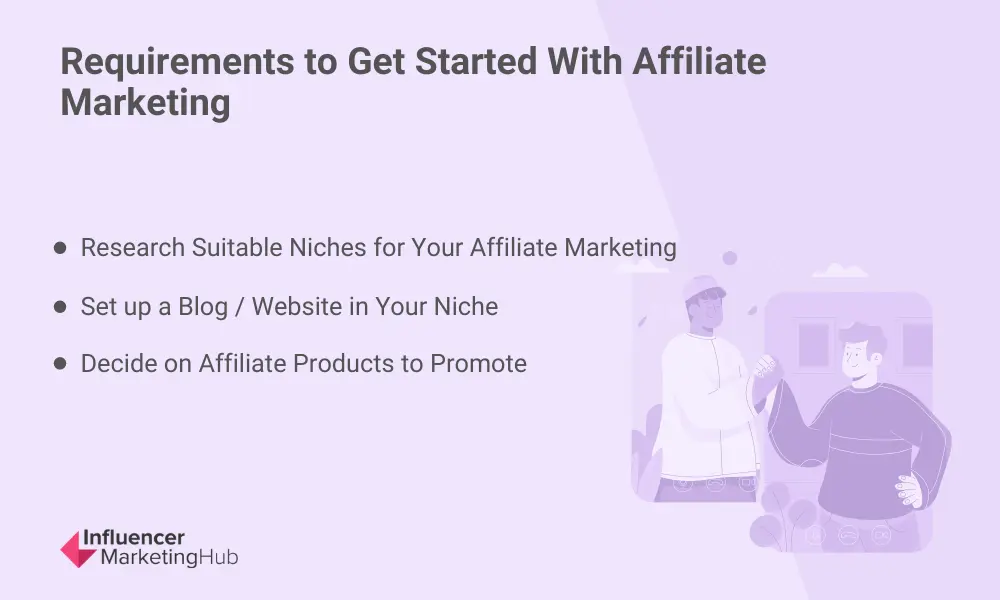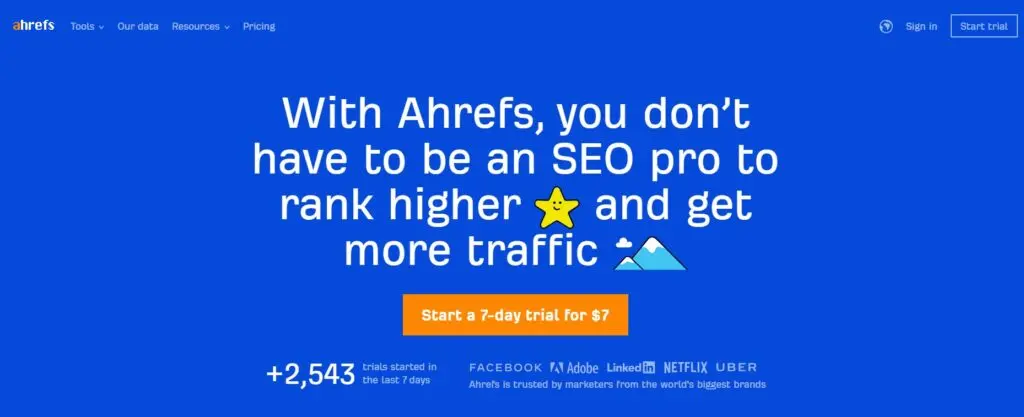There are multiple ways you can earn money online. If you want to create a website, there are three main ways you can monetize it: ads, selling products, and affiliate marketing. The problem with advertising is that you need a lot of traffic to make it worthwhile. Also, if you place multiple ads on your site, it cheapens your look. Selling products can be lucrative in the long run, but it can be difficult in the early stages because you need to be in control of the whole product. You are responsible for after-sales service and ensuring that your product complies with local laws and regulations and is generally up-to-scratch. However, setting up an affiliate marketing site is more straightforward. You don’t have to deal with customers directly, and you aren’t responsible for supporting the products your customers buy. In this post, we look closely at all you need to do to get started with affiliate marketing.
All You Need to Do to Get Started with Affiliate Marketing:
- What is Affiliate Marketing?
- How Does Affiliate Marketing Work?
- Requirements to Get Started With Affiliate Marketing
- What Makes a Good Niche?
- How to Research a Good Niche for Your Affiliate Marketing
- Using Affiliate Networks to Find Suitable Products
- Creating Suitable Content for Your Blog / Website
- Promote Affiliate Products in Your Content
- Convert Visitors into Affiliate Customers
- Build a Sizeable Email List to Grow Your Affiliate Revenue
What is Affiliate Marketing?

Source: freepik.com
Affiliate marketing outline concept vector illustration. Flat business commercial and advertisement strategy using SEO, pay per click and mail. Human handshake and global online network cooperation.[/caption]
With affiliate marketing, you post content recommending a particular product from a company that operates an affiliate program. You make sure you incorporate links to a site that sells that product. You include a unique code in the URL of your link that tells the affiliate program you have forwarded customers to them. Hopefully, the reader/viewer of your post takes an interest in the product you have recommended and follows through your link to buy the product. The online retailer to whom you’ve sent customers then pays you an agreed commission for your part in making the sale.
One of the most significant advantages of affiliate marketing is that it generates relatively passive income. You can make money while you sleep. But you don’t do so without first putting in the hard graft and setting the base for your success.
The best-known affiliate program is Amazon Associates, and that is where many people start their affiliate marketing. However, they have reduced their payment percentages over time, and you are likely to find more lucrative solutions elsewhere.
How Does Affiliate Marketing Work?
In essence, affiliate marketing involves you recommending a particular product to your followers. Ideally, you walk them through the purchasing process for that product, and some of your followers eventually buy it, with you getting a cut of the sale. To enable this, you need to create articles focusing on relevant topics to recommend those specific items you want your readers/viewers to buy online.
There are four parties involved in affiliate marketing:
- The Product Creator (or Merchant) – these are the firms that provide products for sale.
- The Affiliate Network – this is optional. Many product creators use an intermediary to interact with affiliates. In some cases, such as Amazon, affiliate networks double up as retailers. Affiliate networks collate a catalog of products, which they make available for affiliate marketers to sell.
- The Affiliate Marketer – the people who promote and sell the affiliate products.
- The Consumer – the ultimate purchaser of the products.
There are effectively three steps to the process of making a sale through affiliate marketing:
- You recommend a product or service to your followers on a website, blog, social media, or email list
- A portion of your followers will take notice of your recommendation and click through your affiliate link to a retailer’s eCommerce store
- Your followers make purchases, and the retailer pays you an agreed percentage of the transaction
Commissions vary greatly in affiliate marketing but are generally much higher than what you would get from putting ads on your site.
Requirements to Get Started With Affiliate Marketing
1. Research Suitable Niches for Your Affiliate Marketing
You can build traffic to any website through a combination of
- Search Engine Optimization (SEO)
- Social
- Paid advertising
- Referral traffic
- Returning traffic
For a new website/blog, the easiest, most cost-effective way to gain traffic is by utilizing good SEO. SEO involves making your site appear near the top of Google searches for particular keywords. However, many keywords are highly competitive, and a new website is unlikely to appear in the first few pages of Google for those terms.
You must pick a niche for your affiliate marketing with good usable keywords, where your content can break onto the front page of Google.
You should think about a niche that interests you, where you believe you can make money.
2. Set up a Blog / Website in Your Niche
If you’re already an influencer with an existing following, you may be able to promote your affiliate products to your existing audience – assuming they are compatible with the niche where you have made your name. Most people, however, need to start building an audience from scratch. To do this, you will need to create a relevant website.
It can be challenging to start a website from scratch, however. You face tremendous competition. That’s why it was essential that you first researched a suitable niche.
Many affiliate marketers create their websites using WordPress. You can make a professional quality website in WordPress relatively quickly using a high-quality template, and you don’t need to know how to code.
3. Decide on Affiliate Products to Promote
Assuming that you selected a niche, you will want to choose affiliate products that match that niche. You can use an affiliate network such as ClickBank or ShareASale to determine suitable products to promote.
What Makes a Good Niche?
Much of the success of your affiliate marketing will come down to your niche. If you look across the web, you will see sites tend to fit into one of the following types of niches:
- Broad niches – these are large sites that specialize in a range of interconnected topics, e.g., health, gaming, news, self-help
- Community niches – these cover a smaller range of topics, usually in more depth, and have a dedicated community, e.g., men’s health, strategy games, Muslim news, self-awareness
- Product-based niches – these focus on a specific product type, e.g., iPhones, study programs, socks, electric guitars
- Problem-based niches – these focus on a specific life problem, e.g., how to keep your house tidy, car maintenance for beginners, studying for exams, makings school lunches
Beginning affiliate marketers will always struggle with broad niches as you will face much competition. However, have the highest earnings potential if you are prepared to look at the long-term. Community niches provide smaller scope than broad niches, but it is easier to create a community of like-minded followers. You will find many affiliate marketers who create product-based sites. The barriers to entry are low, but the returns are probably limited. If you wish to operate in a problem-based niche, you will need to ensure that you promote high-quality products to solve your audience’s problems. If you aren’t already, you will have to upskill yourself to be highly knowledgeable about the niche.
How to Research a Good Niche for Your Affiliate Marketing
You can use a tool like Ahrefs to determine the search volume and keyword difficulty for specific terms.
Wherever possible, think about the intent of searchers. You will want to focus on keywords that indicate that the searcher may be interested in making a purchase. Many popular terms will be of little value to you because they are generally used by people not interested in buying a product. For example, “best strawberry jam” would be a more valuable keyword to you if you’re promoting a jam brand than “how to make strawberry jam.”
Using Affiliate Networks to Find Suitable Products
An excellent way to find affiliate products to promote in your niche is to join an affiliate network. These are large businesses that connect affiliate marketers with multiple affiliate merchants. Some of the affiliate networks you could investigate include ClickBank, ShareASale, AvantLink, LinkConnector, Awin, CJ Affiliate, FlexOffers, and Pepperjam. The largest affiliate network of all is Amazon Associates.
Although many individual firms offer affiliate programs, an advantage of working with one of the networks is that they provide a wide variety of products, making it easier for you to find quality ones in your niche.
Not all affiliate networks are the same, however. When selecting a network, look for ones that meet the following criteria:
- Their products are high quality
- They offer decent payout levels
- Their sales material looks trustworthy and legitimate
- You can find other websites promoting their products
Affiliate networks tend to offer more detailed data on how well their products sell than individual affiliate product creators.
Creating Suitable Content for Your Blog / Website
Once you have set up your site and know the products you intend to recommend, you need to build your site with content that you can then share with your followers. There are two primary forms this can take:
- The base content of your website; permanent pages giving critical details about your niche and how you can help your visitors
- Regularly changing content, for example, blog posts, each of which focuses on a specific keyword.
Each time another site links to your content, you will gain a little more “link juice” from Google, which will gradually raise your posts up the rankings. To benefit from this linking, however, you need to ensure that you produce high-quality content. Your articles can’t appear like ads. They have to relate to topics in your niche (that match your achievable keywords) and provide value to your readers.
You need to consider who your target audience is. They will be people who are likely to consider buying your product if you can show them how it will meet their needs and solve their problems. There is little point in trying to cater to people who will never buy your product, no matter how much work you do.
The affiliate marketer has the job of creating high-value helpful content that will sway their target audience into buying the product. So, you need to write content that will match relevant keywords in your niche. For example, suppose you are promoting a bagless vacuum cleaner. In that case, you could write articles about “advantages of bagless vacuum cleaners,” “buy environmentally friendly vacuum cleaner,” and “how can I clean up pet hairs.” Big websites are likely to already hold the top Google rankings for more general terms, like “buy vacuum cleaner.” Therefore, you should focus more on long-tail keyword terms, i.e., longer, more specific terms. Again, you can use a tool like Ahrefs to find suitable keywords to focus on for your content.
Promote Affiliate Products in Your Content

Source: freepik.com
Remember that your content needs to be valuable. It shouldn’t be advertising puff. However, you can insert relevant affiliate links into your content. You should only add affiliate links where it appears natural and valuable to your audience.
Suppose you are reviewing multiple products in a post (including some that are not your affiliate products). In that case, you should generally ensure that you include your products, and their related affiliate links, early in your article.
Convert Visitors into Affiliate Customers
The majority of visitors to your site won’t go through the next step and purchase your affiliate products. However, you can help increase your conversion rate, i.e., the percentage of visitors that follow through and make a purchase.
Some tools help you increase your conversions, e.g., Optinmonster, Optimizely, Unbounce, Lucky Orange, and Crazy Egg. You can optimize your website to make it as easy for potential customers to use as possible. You might even consider adding a popup campaign to grab your customers’ attention.
Build a Sizeable Email List to Grow Your Affiliate Revenue
Make a point of capturing as many of your site visitors’ email addresses as possible. People who give you their email addresses are far more likely to take notice of your marketing than everybody else. You can then create newsletters or other targeted promotions that you send out as email messages to your list.
To do this, you will need to create some form of lead magnet. This is something that your target audience will find valuable. You set things up so that the only way somebody can obtain your lead magnet is by leaving their email address.
We have previously shared our Ultimate Email Marketing Strategy Guide.
Email marketing is as lucrative for affiliate marketers as it is for anybody else marketing online.





